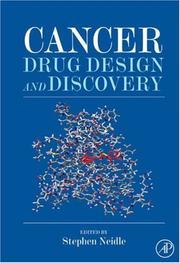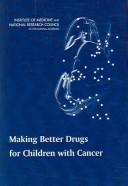| Listing 1 - 10 of 71 | << page >> |
Sort by
|
Book
ISBN: 0128137533 Year: 2018 Publisher: London, United Kingdom : Academic Press,
Abstract | Keywords | Export | Availability | Bookmark
 Loading...
Loading...Choose an application
- Reference Manager
- EndNote
- RefWorks (Direct export to RefWorks)
Antineoplastic agents. --- Anticancer agents --- Antineoplastic drugs --- Antineoplastics --- Antitumor agents --- Antitumor drugs --- Cytotoxic drugs --- Inhibitors, Neoplasm --- Neoplasm inhibitors --- Drugs --- Cancer --- Chemotherapy
Book
ISBN: 1608059227 9781608059225 9781608059232 Year: 2014 Publisher: Sharjah, United Arab Emirates
Abstract | Keywords | Export | Availability | Bookmark
 Loading...
Loading...Choose an application
- Reference Manager
- EndNote
- RefWorks (Direct export to RefWorks)
""Frontiers in Anti-Cancer Drug Discovery"" is an Ebook series devoted to publishing the latest and the most important advances in Anti-Cancer drug design and discovery. Eminent scientists write contributions on all areas of rational drug design and drug discovery including medicinal chemistry, in-silico drug design, combinatorial chemistry, high-throughput screening, drug targets, recent important patents, and structure-activity relationships. The Ebook series should prove to be of interest to all pharmaceutical scientists involved in research in Anti-Cancer drug design and discovery. Each vo
Antineoplastic agents. --- Anticancer agents --- Antineoplastic drugs --- Antineoplastics --- Antitumor agents --- Antitumor drugs --- Cytotoxic drugs --- Inhibitors, Neoplasm --- Neoplasm inhibitors --- Drugs --- Cancer --- Chemotherapy
Book
ISBN: 1681083892 9781681083896 Year: 2017 Publisher: Sharjah Bentham Science Publishers
Abstract | Keywords | Export | Availability | Bookmark
 Loading...
Loading...Choose an application
- Reference Manager
- EndNote
- RefWorks (Direct export to RefWorks)
Frontiers in Anti-Cancer Drug Discovery is a book series devoted to publishing the latest and the most important advances in anti-cancer drug design and discovery. Eminent scientists write contributions on all areas of rational drug design and drug discovery including medicinal chemistry, in-silico drug design, combinatorial chemistry, high-throughput screening, drug targets, recent important patents, and structure-activity relationships. The book series should prove to be of interest to all pharmaceutical scientists involved in research in anti-cancer drug design and discovery. Each: Volume is devoted to the major advances in anti-cancer drug design and discovery. The book series is essential reading to all scientists involved in drug design and discovery who wish to keep abreast of rapid and important developments in the field.The eighth: Volume of the series features chapters covering the following topics:- T cells in gastrointestinal cancers- The pharmacology of adjudin - a male contraceptive with anti-cancer properties- Manipulating the tumor microenvironment- Treatment of hepatocellular carcinoma- Gold-based compounds as potential anti-cancer drug candidates- Oral nanostructure drug delivery for anti-cancer treatment
Antineoplastic agents. --- Anticancer agents --- Antineoplastic drugs --- Antineoplastics --- Antitumor agents --- Antitumor drugs --- Cytotoxic drugs --- Inhibitors, Neoplasm --- Neoplasm inhibitors --- Drugs --- Cancer --- Chemotherapy

ISBN: 1281763683 9786611763688 0080554954 0123694485 9780123694485 9780080554952 Year: 2008 Publisher: New York Academic Press
Abstract | Keywords | Export | Availability | Bookmark
 Loading...
Loading...Choose an application
- Reference Manager
- EndNote
- RefWorks (Direct export to RefWorks)
The ultimate source of information on the design of new anticancer agents, emphasizing small molecules, this newest work covers recent notable successes resulting from the human genome and cancer genomics projects. These advances have provided information on targets involved in specific cancers that are leading to effective medicines for at least some of the common solid tumors. Unique sections explain the basic underlying principles of cancer drug development and provide a practical introduction to modern methods of drug design.
Antineoplastic agents --- Development. --- Design. --- Anticancer agents --- Antineoplastic drugs --- Antineoplastics --- Antitumor agents --- Antitumor drugs --- Cytotoxic drugs --- Inhibitors, Neoplasm --- Neoplasm inhibitors --- Drugs --- Cancer --- Chemotherapy
Book
ISBN: 0123972280 0123965217 1299954235 9780123972286 9780123965219 9780123965219 Year: 2014 Publisher: Amsterdam Elsevier Science
Abstract | Keywords | Export | Availability | Bookmark
 Loading...
Loading...Choose an application
- Reference Manager
- EndNote
- RefWorks (Direct export to RefWorks)
Antineoplastic agents --- Cancer --- Design. --- Chemotherapy. --- Anticancer agents --- Antineoplastic drugs --- Antineoplastics --- Antitumor agents --- Antitumor drugs --- Cytotoxic drugs --- Inhibitors, Neoplasm --- Neoplasm inhibitors --- Drugs --- Treatment --- Chemotherapy

ISBN: 1282083325 9786612083327 0309549256 9780309549257 6612083328 0309096081 9780309096089 0309181860 Year: 2005 Publisher: Washington, D.C. National Academies Press
Abstract | Keywords | Export | Availability | Bookmark
 Loading...
Loading...Choose an application
- Reference Manager
- EndNote
- RefWorks (Direct export to RefWorks)
Antineoplastic agents. --- Oncology. --- Tumors --- Anticancer agents --- Antineoplastic drugs --- Antineoplastics --- Antitumor agents --- Antitumor drugs --- Cytotoxic drugs --- Inhibitors, Neoplasm --- Neoplasm inhibitors --- Drugs --- Cancer --- Chemotherapy
Book
ISBN: 1608057984 9781608057986 9781608057993 Year: 2014 Publisher: Sharjah, United Arab Emirates
Abstract | Keywords | Export | Availability | Bookmark
 Loading...
Loading...Choose an application
- Reference Manager
- EndNote
- RefWorks (Direct export to RefWorks)
Frontiers in Clinical Drug Research - Anti-Cancer Agents - Volume 1 should prove to be a valuable resource for pharmaceutical scientists and postgraduate students seeking updated and critical information for developing clinical trials and devising research plans in the field. The chapters in this volume have been written by leading experts from the field.The contents of this book include new approaches to cancer therapy, treatment of metastatic non-small cell lung cancer with epidermal growth factor receptor-tyrosine kinase inhibitors, targeting key signaling pathways in pediatric brain tumors
Cancer --- Antineoplastic agent. --- Alternative treatment. --- Alternative therapy --- Treatment --- Antineoplastic agents. --- Anticancer agents --- Antineoplastic drugs --- Antineoplastics --- Antitumor agents --- Antitumor drugs --- Cytotoxic drugs --- Inhibitors, Neoplasm --- Neoplasm inhibitors --- Drugs --- Chemotherapy
Book
ISBN: 1681084813 9781681084817 Year: 2017 Publisher: Sharjah Bentham Science Publishers
Abstract | Keywords | Export | Availability | Bookmark
 Loading...
Loading...Choose an application
- Reference Manager
- EndNote
- RefWorks (Direct export to RefWorks)
Cancer --- Antineoplastic agents. --- Anticancer agents --- Antineoplastic drugs --- Antineoplastics --- Antitumor agents --- Antitumor drugs --- Cytotoxic drugs --- Inhibitors, Neoplasm --- Neoplasm inhibitors --- Drugs --- Antineoplastic agents --- Chemotherapy. --- Chemotherapy --- Treatment
Book

ISBN: 3110366614 3110386364 9783110366624 3110366622 9783110386363 9783110366617 9783110366617 3110345943 9783110345940 Year: 2014 Publisher: Berlin Boston
Abstract | Keywords | Export | Availability | Bookmark
 Loading...
Loading...Choose an application
- Reference Manager
- EndNote
- RefWorks (Direct export to RefWorks)
Peritoneal dissemination is a common route of cancer metastasis. The benefit of administering chemotherapy directly into the peritoneal cavity is supported by preclinical and pharmacokinetic data. In comparison to intravenous (IV) treatment, intraperitoneal (IP) administration results in a several-fold increase in drug concentration within the abdominal cavity. There is now growing evidence from clinical studies showing a survival advantage for IP chemotherapy in various tumor typies, including ovarian, gastric and colorectal cancer. However, while the use of IP chemotherapy is slowly gaining acceptance, it is not universal, largely due to the greater toxicity associated with this approach. Moreover, efficacy of IP chemotherapy is limited by poor distribution within the abdominal cavity and by poor tissue penetration. A new way of IP chemotherapy is the application of cytotoxics in form of a pressurized aerosol into the abdominal of thoracic cavity. Pressurized intraperitoneal aerosol chemotherapy (PIPAC) is applied through laparoscopic access using two balloon trocars in an operating room equipped with laminar air-flow. In a first step,a normothermic capnoperitoneum is established with a pressure of 12 mmHg. A cytotoxic solution (about 10% of a normal systemic dose) is nebulized with a micropump into the abdominal cavity, and maintained for 30 min. The aerosol is then removed through a closed suction system. Applying an aerosol in the peritoneal cavity allows a homogeneous distribution of the chemotherapeutic agent within the abdomen. Furthermore, an artificial pressure gradient is generated that overcomes tumoral interstitial fluid pressure, an obstacle in cancer therapy. This results in a higher local drug concentration compared to conventional IP or IV chemotherapy. At the same time the plasma concentration of the chemotherapeutic agent remains low. In first clinical studies with limited number of patients in ovarian, gastric and colorectal cancer, as well as peritoneal mesothelioma, PIPAC has obtained encouraging tumor response rates and survival, with a low-side effects profile. Larger clinical trials are currently ongoing to examine if these data can be reproduced and extrapolated to other situations.
Antineoplastic agents. --- Aerosols. --- Colloids --- Gases --- Anticancer agents --- Antineoplastic drugs --- Antineoplastics --- Antitumor agents --- Antitumor drugs --- Cytotoxic drugs --- Inhibitors, Neoplasm --- Neoplasm inhibitors --- Drugs --- Cancer --- Chemotherapy --- Aerosol.
Book
ISBN: 9781617052521 1617052523 9781620700761 162070076X Year: 2016 Publisher: New York
Abstract | Keywords | Export | Availability | Bookmark
 Loading...
Loading...Choose an application
- Reference Manager
- EndNote
- RefWorks (Direct export to RefWorks)
Antineoplastic agents. --- Tumors. --- Neoplasms --- Tumours --- Pathology --- Cysts (Pathology) --- Oncology --- Anticancer agents --- Antineoplastic drugs --- Antineoplastics --- Antitumor agents --- Antitumor drugs --- Cytotoxic drugs --- Inhibitors, Neoplasm --- Neoplasm inhibitors --- Drugs --- Cancer --- Chemotherapy
| Listing 1 - 10 of 71 | << page >> |
Sort by
|

 Search
Search Feedback
Feedback About UniCat
About UniCat  Help
Help News
News